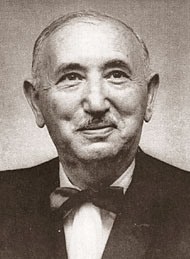David Wechsler

David Wechsler.
David Wechsler was born on January 12, 1896 in Lespedi, Romania. He went to the City College of New York, as well as Columbia University. Wechsler was an American psychologist and invented many widely-used intelligence tests such as the Wechsler Intelligence Scale for Children in 1949 and the Wechsler Adult Intelligence Scale in 1955. Although they have been updated, these tests are still popular to this day, now known as the WISC-IV 2003 and WAIS-III 1997. Wechsler believed that
“Intelligence is the aggregate or global capacity of the individual to act purposefully, to think rationally and to deal effectively with his environment.”
With this thinking process, he made it so that his tests would be used to determine the intelligence of people ranging from ages six through 89. Not only this, but his IQ tests were also used to help determine which students needed special education in schools. This in turn allowed for students with special needs to be educated at their own pace. Although Wechsler passed away on May 2, 1981, his work is still coming to use to this day.
“Intelligence is the aggregate or global capacity of the individual to act purposefully, to think rationally and to deal effectively with his environment.”
With this thinking process, he made it so that his tests would be used to determine the intelligence of people ranging from ages six through 89. Not only this, but his IQ tests were also used to help determine which students needed special education in schools. This in turn allowed for students with special needs to be educated at their own pace. Although Wechsler passed away on May 2, 1981, his work is still coming to use to this day.
|
One may wonder how accurate Wechsler's IQ Test would be it comes to determining a person's level of intelligence. According to expert author Amy Nutt, the IQ test is fairly accurate. However, to make it even more reliable, testing multiple times would be helpful. In fact, Nutt has observed that
"Many people choose to take multiple IQ tests instead of single standard IQ tests, simply because the former gives a more accurate representation of intelligence." |
These environmental factors could include mood, state of mind, and location of the test. By splitting the difference between a person's multiple scores, they would get a better understanding of what their IQ really is.

